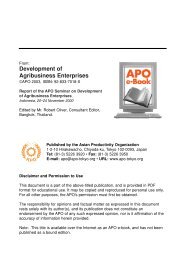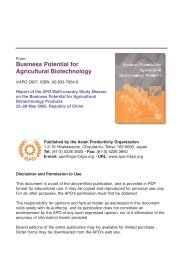Annual Report 2009 - Asian Productivity Organization
Annual Report 2009 - Asian Productivity Organization
Annual Report 2009 - Asian Productivity Organization
Create successful ePaper yourself
Turn your PDF publications into a flip-book with our unique Google optimized e-Paper software.
ORGANIZATION<br />
12<br />
of success in <strong>Asian</strong> countries. This could be a source<br />
of best practices and benchmarks. While sharing<br />
the Philippine experience, he said that in the 1980s,<br />
work improvement teams based on the quality circle<br />
concept had been introduced in selected government<br />
agencies. From 1988 to 2001, grand productivity plans<br />
such as President Aquino’s Government <strong>Productivity</strong><br />
Program, President Ramos’ National Action Agenda<br />
for <strong>Productivity</strong>, and President Estrada’s Mediumterm<br />
National Action Agenda for <strong>Productivity</strong> had<br />
been adopted. Under the Ramos administration, the<br />
Philippine Quality Award was introduced and later<br />
institutionalized. Under the present administration,<br />
the campaign for public-sector productivity had<br />
been intensified. He reported that the National<br />
Competitiveness Council had been formed in 2006 to<br />
oversee the development of a culture of excellence in<br />
government agencies. Similar initiatives such as the<br />
Executive Order to install ISO-certified systems and<br />
performance governance systems using the balanced<br />
scorecard had been taken, and Executive Secretary<br />
Ermita believed that this indicated the Philippines’<br />
commitment to public-sector productivity. He pledged<br />
that the Philippines would continue to set new strategic<br />
directions and close the gaps that existed with the<br />
most competitive countries.<br />
Executive Secretary Eduardo R. Ermita delivering the Keynote<br />
Address<br />
In concluding, Executive Secretary Ermita, on behalf<br />
of the Government of the Philippines, congratulated<br />
all delegates and hoped that they would have a<br />
productive meeting.<br />
Secretary-General’s Statement<br />
APO Secretary-General Shigeo Takenaka first<br />
thanked the Government of the Philippines for<br />
hosting the 50th WSM. He reminded the delegates<br />
that the WSM was expected to accomplish two major<br />
tasks: finalizing the programs for 2010; and reviewing<br />
the proposed priority of APO projects for the 2011<br />
and 2012 biennium, which would serve as a basis for<br />
determining the total membership contributions for<br />
those years by the GBM. Secretary-General Takenaka<br />
pointed out that some modifications had been made<br />
in the 2010 Program Plan and some projects dropped.<br />
Given the persistent appreciation of the yen, he<br />
acknowledged that the Secretariat might be compelled<br />
to make more adjustments, probably knocking off a<br />
few more projects from the list.<br />
The Secretary-General pointed out that projects<br />
for 2011 and 2012 were listed with their priority and<br />
the plan basically reflected efforts to serve member<br />
countries meaningfully. The Secretariat had ranked<br />
projects according to six prioritization criteria:<br />
projects with new topics; projects with new methods<br />
or outreach; projects proposed at the GBM/WSM;<br />
projects supported by the survey results received from<br />
member countries; projects that member countries<br />
were committed to hosting; and projects with training<br />
elements.<br />
The Secretary-General noted that the Secretariat had<br />
assigned priority to projects that member countries<br />
had offered to host as a sign of their commitment to<br />
the APO and to the cause of productivity in the region<br />
as a whole. He pointed out that APO resources were<br />
limited, especially with the constraints resulting from<br />
the global financial crisis continuing to affect member<br />
countries, and he welcomed the steps member countries<br />
had taken to volunteer to host APO projects and<br />
bear all local implementation costs in a genuine spirit<br />
of mutual cooperation. He added that the Secretariat<br />
attached particular importance to training courses<br />
considering their tangible, measurable contributions<br />
and the ratio of project categories had been altered to<br />
address the needs of member countries. Not only had<br />
the number of training courses been increased but also<br />
the quality of projects had been enhanced, including<br />
the development of manuals and the addition of<br />
projects leading to certification.<br />
The Secretary-General then elaborated on the three<br />
focus areas of the APO: 1) the capacity building of<br />
NPOs; 2) taking advantage of new opportunities<br />
provided by IT; and 3) undertaking more projects<br />
that generate visible, measurable impacts. To build<br />
the capacity of NPOs, in recent years the Secretariat<br />
had successfully shifted the majority of its projects to<br />
Categories A and B. The Secretariat had also taken<br />
two new initiatives to bolster Category C projects:<br />
in-country programs for developing productivity<br />
professionals; and two-tiered projects. Three pilot
















